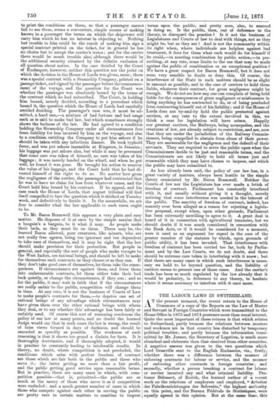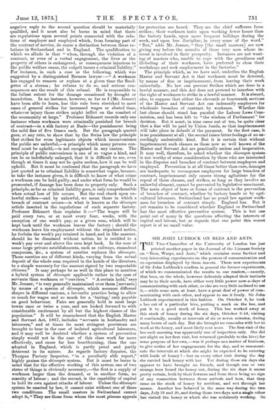THE LABOUR LAWS IN SWITZERLAND T the present moment, the
recent return to the House of Commons of a copy of the Reports on the Law of Master and Servant in Foreign Countries which were transmitted to the Home Office in 1873 and 1874 possesses more than usual interest. Quite the most important of these returns is that which relates to Switzerland, partly because the relations between masters and workmen are in that country less disturbed by temporary political troubles; and partly because the information trans- mitted by Mr. Jenner, the Secretary of Legation, is much more abundant and elaborate than that received from other countries. A negative answer was given to the two questions which Lord Granville sent to the English Embassies, viz., firstly, whether there was a difference between the manner of enforcing contracts for labour or str-vice, and the manner of enforcing other contracts in foreign countries ; and secondly, whether a person breaking a contract for labour or service incurred any and what criminal liability. Pro- fessor Bohmert, of Zurich, the learned author of a recent work on the relations of employers and employed, " Arbeiter der Fabrikenrichtungen der Schweitz,” the highest authority on this point, and the Bureau Federale de Statistiques, were equally agreed in this opinion. But at the same time, this
negative reply to the second question should be materially qualified, and it must also be borne in mind that there are regulations upon several points connected with the rela- tions of employer and employed which, from forming part of the contract of service' do cause a distinction between these re- lations in Switzerland and in England. The qualification to which we allude is that "when, through the violation of a contract, or even of a verbal engagement, the lives or the property of others is endangered, or consequences injurious to the public welfare ensue, the culprit incurs a criminal liability." For instance, in such a case as the following, which was suggested by a distinguished Beniese lawyer :—" A workman has engaged to remove or replace at a given time the flood- gates of a stream ; he refuses to do so, and serious con- sequences are the result of this refusal. He is responsible to the fullest extent for the damage occasioned by drought or inundation. In no instance, however, so far as I (Mr. Jenner) have been able to learn, has this rule been stretched to meet cases of general strikes for increased wages or abated time, whatever injury those strikes might inflict on the comfort of the community at large." Professor Bohmert records only one instance where workmen were criminally punished for breach of contract—in a silk factory at Basle—the punishment being the mild fine of five francs each. But the paragraph quoted goes, at any rate, to show that by the Swiss law the principle that strikes for even legitimate objects which inconvenience the public are unlawful,—a principle which many persons con- tend must be upheld,—is not recognised in any canton. The principle of public convenience is one of so vague a kind, and can be so indefinitely enlarged, that it is difficult to see, even though at times it may not be quite useless, how it can be well upheld. But it must be confessed that the paragraph we have just quoted as to criminal liability is somewhat vague, because, to take the instance given, it is difficult to know of what crime a workman can be held guilty, and under what form he would be prosecuted, if damage has been done to property only. Such a principle, as far as criminal liability goes, is only comprehensible when actual loss of life occurs. But the real check upon un- lawful strikes—and by unlawful, we mean those in which a breach of contract occurs—is what is known as the de'compte article inserted in the regulations of each separate factory. Professor Bohmert thus explains it :—" The wages will be paid every two, or at most every four, weeks, with the exception of one week's pay, or a given sum, which will be kept back until the workman leaves the factory ; should the workman leave his employment without the stipulated notice, he forfeits the week's pay retained in hand, and in like manner, should he be dismissed without notice, he is entitled to a week's pay over and above the sum kept back. In the case of some large private establishments, such as railways, steamboat companies, &c., a system of sureties replaces the dicompte. Those sureties are of different kinds, varying from the actual deposit of the whole sum required in the hands of the directors, to a simple warranty for the amount signed by two respectable citizens." It may perhaps be as well in this place to mention a hybrid system of de'compte applicable rather in the ease of servants than workmen or " ouvriers." "A certain hold," says Mr. Jenner, "is very generally maintained over them [servants] by means of a species of decompte, which assumes different shapes in different cantons, a favourite practice being to allow so much for wages and so much for a 'fairing,' only payable on good behaviour. Fairs are generally held in most large towns once or twice a year, and are looked forward to with considerable excitement by all but the highest classes of the population." It will be remembered that the English Master and Servant Act, 1867, includes "servants in husbandry and labourers," and at times its most stringent provisions are brought to bear in the case of isolated agricultural labourers, and it may well be doubted whether a system of prevention simply would not in the case of this class work far more effectively, and cause far less heartburning, than the one adopted in England, which is partly penal and partly deterrent in its nature. As regards factory disputes, the Thurgau Factory Inspector, "in a peculiarly able report," highly praises the decompte system. But it must be borne in -mind that for the effective working of this system one of two states of things is obviously necessary,—the first is a supply of workmen larger than the demand, or in another form, no scarcity of labour ; and the second, is the capability of capital to hold its own against attacks of labour. Unless the dicompte system be enacted by law, it cannot exist without one of thew two conditions. The small masters in Switzerland cannot adopt it," They are those from whom the most piteous appeals
for protection are heard. They are the chief sufferers from strikes ; their workmen insist upon working fewer hours than the factory hands, upon more frequent holidays during the week, and upon less discipline, in every sense of the word." "But," adds Mr. Jenner, "they [the small masters] are now giving way before the assaults of those very men whose in- terest is involved in their prosperity. Instances are not want- ing of masters who, unable to cope with the greediness and ill-feeling of their workmen, have preferred to close their workshops and seek employment in the factories."
The principle which, as we have said, underlies the English Master and Servant Act is that workmen must be deterred, by means of fine or imprisonment, from leaving their work unlawfully. No law can prevent Strikes which are done in a lawful manner, and this Act does not pretend to interfere with the right of workmen to strike in a lawful manner. It is absurd, also, to suppose that either the eleventh or fourteenth sections of the Master and Servant Act can indemnify employers for- wholesale breaches of contract by workmen. Whether this last clause should stand has puzzled the Labour Laws Com- mission, and has been left to "the wisdom of Parliament" for decision. But it must, in nine cases out of ten, be quite clear that a fine will be paid by Union funds, so that imprisonment will take place in default of the payment. In the first case, it is no punishment at all ; the second raises bitter feelings of an ex- ceedingly undesirable kind. But it is certain that without imprisonment such clauses as those now so well known of the Master and Servant Act are practically useless and inoperative. It may well, therefore, be asked whether the decompte system is not worthy of some consideration by those who are interested in the disputes and breaches of contract between employers and employed. Prevention is at all times better than cure, damages are inadequate to recompense employers for large breaches of contract, imprisonment only causes strong agitations for the repeal of these clauses, and strikes, so long as they involve no unlawful element, cannot be prevented by legislative enactment. The main object of laws or forms of contract is the prevention of breaches of contract, whether by factory hands or by agri- cultural labourers. Switzerland has no penal law against work- men for breaches of contract simply. England has. But it yet remains to be considered whether England or Switzerland has the most effective preventive system. This is but one point out of many in the questions affecting the interests of capital and labour, but as regards that one point this recent report is of no small value.



































 Previous page
Previous page